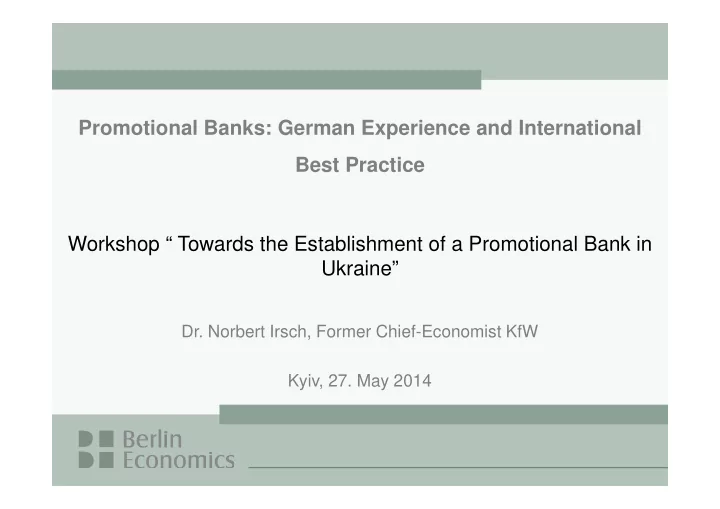

Promotional Banks: German Experience and International Best Practice Workshop “ Towards the Establishment of a Promotional Bank in Ukraine” Dr. Norbert Irsch, Former Chief-Economist KfW Kyiv, 27. May 2014
Contents I. Promotional Bank (PB): Chances and Risks II. Chances and Risks: General Consequences III. Necessary Structural Features IV. Way of Operation V. Foundation, Capital Endowment VI. Recommended Areas of Activity Contact 2
I. Promotional Bank: Chances and Risks Promotional Bank (PB) = Institution created by policy Major tasks – chances • Promotion of politically desired economic developments • Correction of deficits caused by market failure • Bundling/Chanelling of economic policy`s actions (more transparency and higher efficiency of support schemes) Major dangers – risks • Misuse of PB by policy (particular or lobby groups` interests) • Neglect of prudential behaviour and sound banking due to political pressure or incompetence (loss of solvency) • Possible detrimental impacts on the financial system 3
II. Chances and risks: General Consequences PB`s design and organization should ensure strong inherent provisions and incentives for • Orientation to common welfare • Strong governance/pursuing long-term financial sustainability (=efficient/effective promotion plus solvency) • Productive cooperation with commercial financial institutions (no conflict of interests, no crowding out) Necessary: Appropriate structural arrangements and operational restrictions These arrangements/restrictions should be laid down clearly and firmly in the founding documents of PB 4
III. Necessary Structural Features (1) • Policy`s influence must be restricted to defining and supervising strategy, activity areas and guidelines for the way of operation. No policy interference in single or day-to-day decisions • Within this framework: PB`s management decides autonomously, in compliance with sound banking. Management is liable for PB`s promotional and commercial results (profit & loss account) • To ensure limitations of political influence: PB`s supervisory board should be a system of checks & balances. Besides the capital owner(s) (government) the supervisory board should be made up of further stakeholders with voting rights (e.g. parliament, NBU, chamber of commerce, banking association, SME- association, independent experts, ...) Policy (government) can mandate PB with special tasks or single financings only • if two prerequisites are fulfilled: • Policy has to cover risks and costs • PB`s supervisory board must have approved the government`s mandate 5
III. Necessary Structural Features (2) PB`s independence of policy requires a material basis, i.e. an autonomous financial promotional potential. Otherwise PB is highly dependent of budget means (government) and thus to political (lobby) interference Promotional potential can be generated by • An appropriate capital endowment (financial standing) • Financial privileges e.g. tax exemptions • Prohibition of disbursements (dividends, profit, capital etc.) • An explicit general state guarantee for PB`s funding Promotional potential enables PB • To fund its activities cheaply, • To run promotional schemes with advantageous conditions • And simultaneously to cover its costs and risks - without recourse to budget means Promotional potential = material prerequisite for real autonomy and long-term financial sustainability of a PB 6
IV. Way of Operation (1) - Restrictions Subsidiarity – No crowding out of commercial banks Principle: PB should only operate in areas where commercial banks are not at all or not satisfactory active. Subsidiarity can be achieved in different ways (depending of specific promotional schemes or financing instruments) by • On-lending via commercial banks (i.e. no direct lending/PB a 2. tier institution) • Joint financing with commercial banks • Ban of specific financing operations of PB (e.g. short-term loans, working capital financing, consumer loans) • No funding by taking deposits, no securities` business on account of others Strict adherence to prudential and sound banking rules (state of the art) • Management (in particular the management board and at the top level) has to consist of high-skilled financial professionals • PB should be subject to prudential bank regulation and supervision • PB should adhere to EU-standards to prevent money laundering (compliance) 7
IV. Way of Operation (2) • High standards of transparency in reporting, disclosure and accountability • Intervention in markets only as far and deep as necessary to achieve the promotional objectives. This principle has to be monitored by PB`s supervisory board (relying on evaluation) • PB`s independence prerequisites the capability to assess and judge economic and financial problems in order to • Identify market failures or other (economic) deficits, • Conceive, design and implement pertaining promotional schemes, • Evaluate existing promotional programmes • Therefore PB needs an own R&D capacity to meet these requirements (or access to such capacity) 8
V. Foundation, Capital Endowment • Highly preferable: PB is founded based on a specific law • Such law should stipulate amongst others the afore mentioned structural features and recommendations & restrictions for the way of operation. A non-law foundation by governmental directive provides weaker autonomy and reputation • The initial capital (in particular the paid-in part) must give PB an excellent financial standing (solvency) – at least in national context. Besides state money also (non-profit seeking) private money without voting right (or only less than blocking minority) would be eligible. A financial engagement of other (national or international) PB`s should be explored • Amount of initial capital??? 9
VI. Recommended Areas of Activity (selection) • Start up financing (preferable seed and early stage) • SME (existing firms) financing (preferable investment) • Innovation (SME, but also larger enterprises; in SME: investment and working capital) • Energy • Energy saving/efficiency: building/housing sector, industry, services • Renewable Energies • Modernisation/effiency of energy infrastructure and utilities (production, transmission, distribution) • Export financing 10
Contact Dr. Norbert Irsch norbert.irsch@googlemail.com BE Berlin Economics GmbH Schillerstr. 59, D-10627 Berlin Tel: +49 30 / 20 61 34 64 0 Fax: +49 30 / 20 61 34 64 9 www.berlin-economics.com Follow us on Twitter @BerlinEconomics 11
Recommend
More recommend